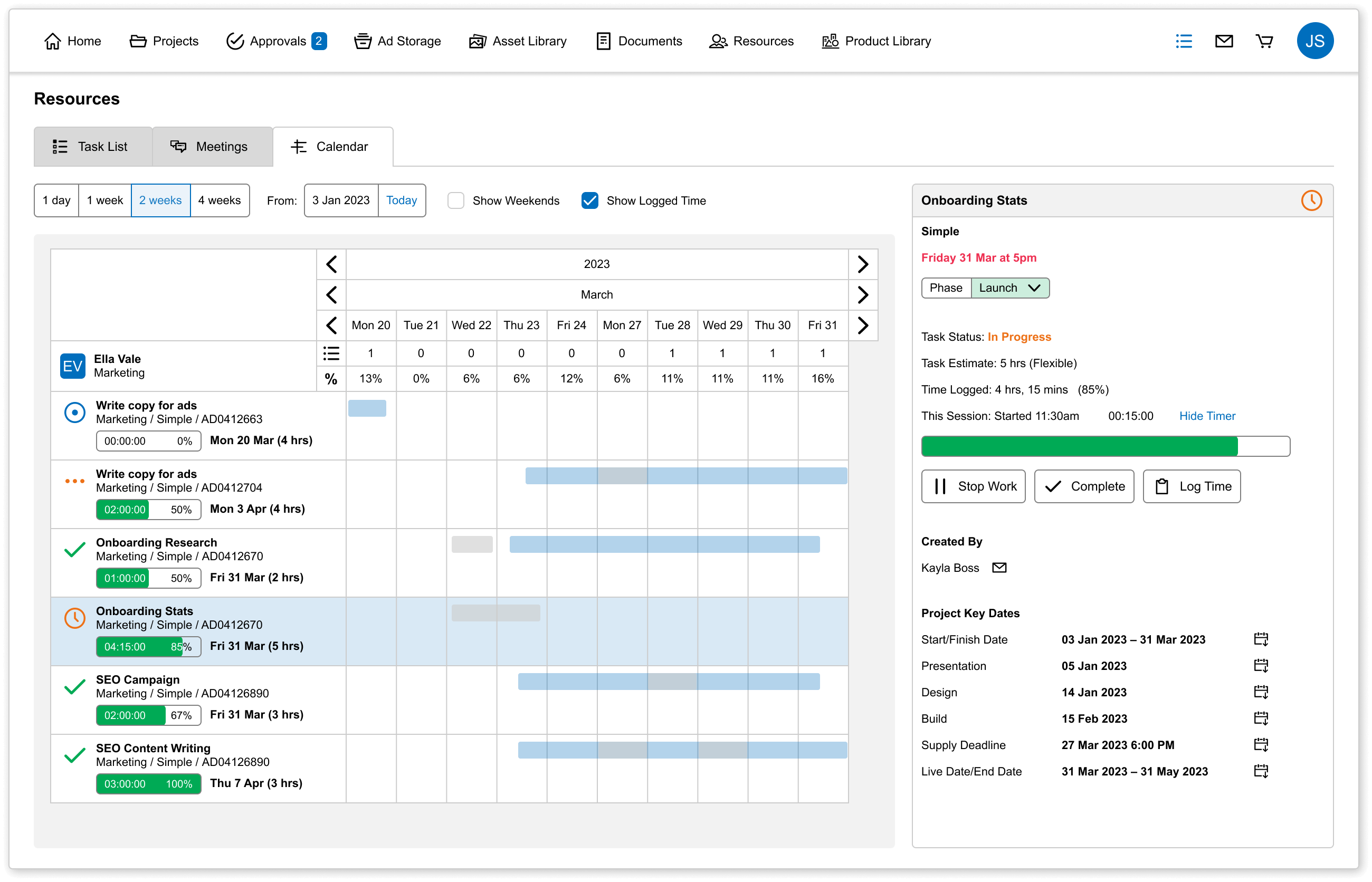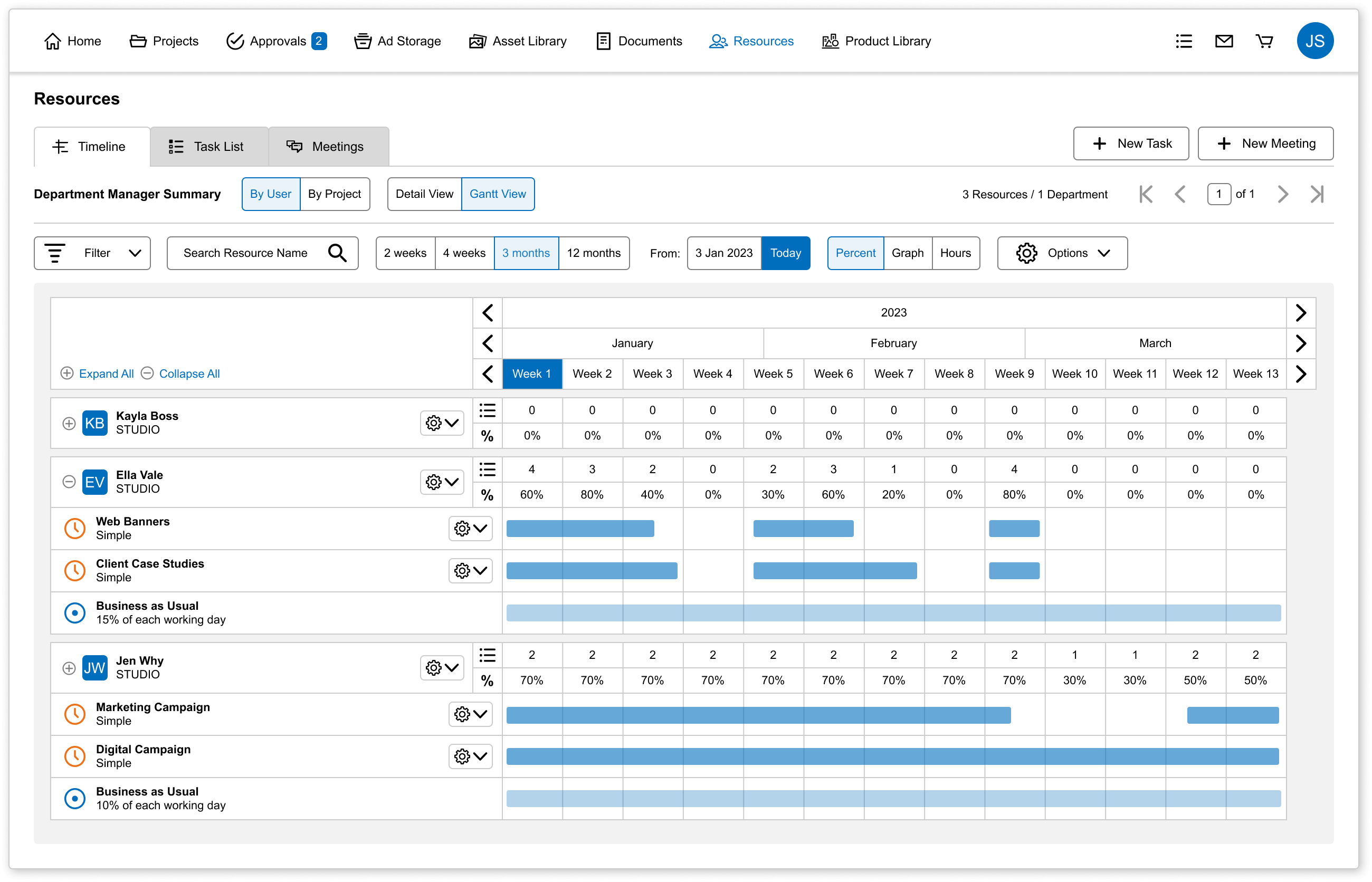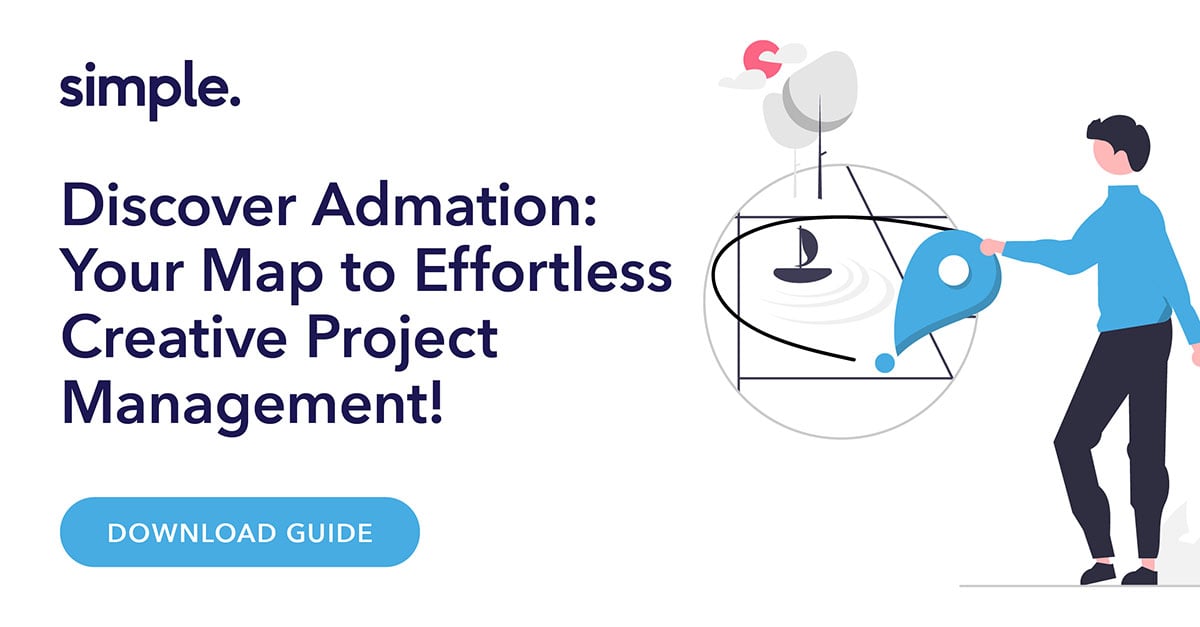Beyond Project Management: The Critical Role of Integrated MRM
By Jodie Byass
MRM: The Missing Piece to Your Marketing Puzzle
Modern marketing has evolved into a complex ecosystem of interconnected campaigns, channels, and content. To navigate this landscape successfully, effective project management is paramount. However, relying solely on project management software without the integration of resource management and task management functionalities can lead to significant challenges.
The reality is that marketing projects are multifaceted endeavours requiring a delicate balance of resources, timelines, and tasks. Without a unified platform that seamlessly integrates these elements, marketing teams risk inefficiency, missed deadlines, and ultimately, compromised project outcomes.
The Fragmented Marketing Project
Marketing projects are intricate webs of interconnected activities, each dependent on various resources, timelines, and tasks. From conceptualization to execution and analysis, every stage demands careful planning and coordination. To illustrate, consider a product launch campaign: it involves creating compelling content, designing visuals, coordinating with external agencies, managing influencer partnerships, and executing paid media campaigns. Each of these elements requires specific resources, deadlines, and a series of tasks.
Effective project management hinges on the ability to orchestrate these components seamlessly. Without a clear overview of resource availability and task dependencies, it becomes challenging to allocate resources optimally, identify potential bottlenecks, and ensure timely delivery.
Siloed tools, lacking the integration of resource management and task management, exacerbate these challenges. When teams rely on disparate systems for tracking resources, managing tasks, and monitoring project progress, information becomes fragmented, and communication suffers. This leads to inefficiencies, delays, and ultimately, compromised project outcomes.

The Resource Riddle: Managing Without MRM
The intricate nature of marketing projects demands a meticulous approach to resource allocation. Without a integrated Marketing Resource Management (MRM) solution, organisations often grapple with significant challenges.
A fundamental issue is the lack of a centralised platform to monitor team member availability and workload. Relying on spreadsheets or email can lead to inaccurate data and mismatched expectations. Without real-time visibility into resource capacity, project managers risk overbooking staff, leading to burnout and decreased productivity.
Without a clear picture of resource availability, it's easy to over allocate staff to high-priority projects, leaving other initiatives understaffed. Conversely, underutilisation of resources occurs when team members are idle due to a lack of assigned tasks or project delays. Both scenarios negatively impact efficiency and cost-effectiveness.
Resource constraints directly affect project timelines and budgets. When team members are overworked or underutilised, it creates a domino effect that impacts project delivery. Overallocated resources can lead to burnout, decreased quality, and missed deadlines. Conversely, underutilised resources result in increased costs and inefficient use of talent.
Effective resource allocation is about more than just assigning people to tasks. It involves considering factors such as skill sets, experience, and workload to optimise team performance. Without a centralised system, it's challenging to identify the best fit for each project, leading to suboptimal resource utilisation and missed opportunities.
The Task Management Trap: Working in Silos
Task management is the backbone of project execution. It involves breaking down larger project goals into smaller, actionable steps. When integrated with resource management, task management becomes a powerful tool for optimising workflows and maximising productivity.
Effective task management is intrinsically linked to resource allocation. By clearly defining tasks, their dependencies, and estimated timeframes, project managers can accurately assess the required resources. Without this integration, it's challenging to match the right people with the right tasks at the right time.
Many marketing projects involve complex task dependencies, where the completion of one task is contingent on the output of another. Without a clear understanding of these dependencies, resource planning becomes a guessing game. Integrated task and resource management enables project managers to visualize task flows, identify potential bottlenecks, and allocate resources accordingly.
When tasks are scattered across different tools and platforms, it creates a fragmented view of project progress. This makes it difficult to track dependencies, monitor deadlines, and ensure tasks are completed on time. Moreover, it increases the risk of errors and miscommunication.
Overloading team members with tasks can lead to burnout, decreased productivity, and ultimately, project delays. Integrated task management allows for equitable workload distribution, preventing task overload and ensuring that team members have the capacity to deliver high-quality work.
The Ripple Effects: When Projects Fail
The repercussions of ineffective project management extend far beyond missed deadlines and budget overruns. When marketing projects falter due to inadequate resource and task management, the impact reverberates throughout the organisation.
The most immediate consequences of poor project management are missed deadlines and budget overruns. When resources are overallocated or underutilised, project timelines inevitably slip. This can lead to missed opportunities, damaged relationships with clients or partners, and eroded credibility. Similarly, budget overruns can strain financial resources and impact overall profitability.
Rushing projects to meet deadlines or compensating for resource shortages often compromises project quality. When team members are overburdened or lack the necessary resources, the quality of deliverables suffers. This can lead to subpar campaigns, ineffective content, and a negative impact on brand reputation.
Poor project management can take a toll on team morale. Overworked employees, frequent project changes, and missed deadlines can lead to burnout, decreased job satisfaction, and increased turnover. Moreover, a chaotic project environment can hinder productivity and creativity.
Ultimately, the consequences of poor project management can extend beyond the organisation itself. Failed campaigns, missed deadlines, or subpar deliverables can damage a brand's reputation. In today's digital age, negative word-of-mouth can spread rapidly, impacting customer trust and loyalty.
The Perils of Disconnected Systems
The complexity of modern marketing necessitates a holistic approach to project management. Unfortunately, many organisations rely on a patchwork of disparate systems to manage different aspects of their projects. While this approach might seem manageable at first, it quickly leads to inefficiencies and hinders overall performance.
When project management, resource allocation, and approval workflows are housed in separate systems, information silos emerge. This disconnection creates several challenges:
- Data Inconsistencies: Maintaining data integrity across multiple platforms is time-consuming and error-prone.
- Reduced Visibility: A fragmented view of project progress hampers decision-making and problem-solving.
- Increased Operational Costs: Managing multiple systems requires additional resources and training.
- Slower Decision Making: The need to access information from various sources delays decision-making processes.
- Inefficient Collaboration: Teams struggle to collaborate effectively when information is scattered across different platforms.
To overcome these challenges, a centralised platform that integrates project management, resource management, and approval workflows is essential.
The MRM Advantage: Admation's Unified Approach
Admation is more than just a project management tool; it's a comprehensive marketing operations solution. By integrating briefing, approvals, project management, resource, and task management into a single platform, Admation provides unparalleled control and visibility over the entire marketing lifecycle.
Unlike traditional approaches that rely on multiple, disconnected systems, Admation eliminates the need to switch between tools or manually transfer data. This centralisation streamlines operations, reduces errors, and saves valuable time.
With Admation, teams can access all relevant project information in one place. This means no more searching through multiple systems or relying on outdated information. Everyone is aligned and working from the same source of truth.
To further streamline project initiation, Admation offers project resource templates. These pre-built frameworks outline tasks, timelines, and resource allocations, providing a solid foundation for new projects. Teams can quickly adapt these templates to suit specific project requirements, ensuring consistency and efficiency.
The marketing department calendar offers a clear overview of resource availability and departmental capabilities. By visualising workload and skillsets, teams can make informed decisions about resource allocation and project planning.

Key benefits of using Admation include:
- Centralised Hub: All aspects of marketing projects, from briefing to delivery, are managed in one place.
- Enhanced Visibility: Real-time insights into project progress, resource allocation, task status, and approvals.
- Streamlined Collaboration: Improved communication and teamwork through a shared platform.
- Accelerated Decision Making: Quick access to critical information for informed decision-making.
- Increased Efficiency: Automation of tasks, reduced manual data entry, and streamlined workflows.
- Optimised Resource Utilisation: Effective resource allocation based on real-time availability and project needs.
- Improved Project Consistency: Project templates ensure standardised approach and faster project initiation.
By adopting a unified platform like Admation that integrates project management, approvals, task and resource management, organisations can break down silos, improve efficiency, and ultimately manage marketing projects and outcomes better.

Conclusion: MRM: The Missing Piece to Your Marketing Puzzle
The complexities of modern marketing demand a sophisticated approach to project management. Without a unified marketing project management platform that integrates resource management and task management, organizations face significant challenges in terms of efficiency, productivity, and project success.
While many project management solutions claim to be tailored for marketing teams, they often fall short by neglecting the critical function of resource management. True efficiency and control come from a single platform that encompasses the entire project lifecycle, from briefing to delivery.
Admation offers a comprehensive solution that addresses this gap. By integrating project management, resource management, approval management, and task management into one platform, Admation empowers teams to optimize resource utilisation, streamline workflows, and deliver exceptional results.
Ultimately, the decision to invest in a truly integrated marketing operations platform is not just about improving project execution; it's about driving business growth, enhancing customer satisfaction, and gaining a competitive edge.
By embracing tools like Admation, organisations can unlock their full potential and thrive in today's dynamic marketing landscape.
Call to Action:
To successfully navigate the complexities of modern marketing, organisations must prioritise the adoption of integrated marketing operations solutions. By investing in a unified platform like Admation, businesses can streamline operations,improve efficiency, and achieve greater success.
Are you ready to transform your marketing operations? Contact us today to learn more about how Admation can help you achieve your goals.

